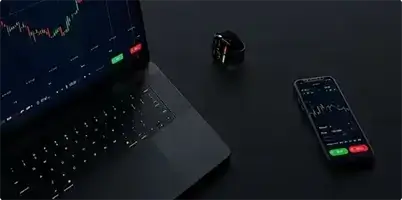
Darren Krett
Thursday 9 February 2023
Option Implied Volatility: Understanding and Utilizing
0
Comments (0)
Darren Krett
Wednesday 18 October 2023
Share on:

Post views: 5257
Categories
Blog
The basic concept of selling stocks is to buy low and sell high to make a profit, but that's only scratching the surface of stock trading. Using historical data to determine the future price of a stock and using options to buy at the price you want to pay can help you improve your outcome. This is known as volatility options strategies, a type of trading that combines implied volatility and options trading together. You can use common trading strategies underneath this trading style, or you can develop your own style using software that helps you track trading data and more.
Implied volatility is a type of calculation that helps traders determine the potential price of a security in the future. The price can go up or down depending on the current state of the market, IE a bull or bear market. During a bear market, implied volatility turns upwards, while it goes down during a bull market.
It's worth noting that implied volatility is a good indicator of a stock price in the future, but can't fully predict what will happen. A stock price can go against the current state of the market for various reasons. However, using implied volatility with options tradings can create an intersection of price expectation and the opportunity to buy a security at a desired price.
Options are a contract that gives the buyer the right to buy or sell the security at a particular price by a specific date. The options holder is not obligated to buy the securities that are in the contract, and the option can expire without penalty. This is a very simplified explanation of options, but implied volatility is used with options contracts to determine the price of a security on a given day and time, and reserve the opportunity to exercise the option that's laid out in the contract.
As previously mentioned, implied volatility helps traders uncover the most likely price of a stock on a given day in the near future. The trader can then find someone who's willing to enter into a contract to sell a certain amount of securities within a given price range within a set timeframe or by the expiration date. Another aspect of options trading is the fact that the option should be executed during the time frame and avoid running down the clock on the contract. The securities in the contract lose value the closer the expiration date approaches, meaning the trader needs to execute the purchase when the price is most optimal.
In the event the price of the security doesn't match with the predictions of the implied volatility calculation, the trader is under no obligation to exercise their options contract. It's worth noting that options trading and implied volatility go hand-in-hand with each other because each is used to support the decision-making process for trading or not.
This is a general overview of how options trading and implied volatility work together, and it's worth noting that there are different ways to trade options. The best options trading courses help you learn more about the different types of trading strategies and how to decide to execute an options contract.
Leviathan Trading Intelligence is an option analytics tool that lays out the information you're seeking intuitively. It provides you with up-to-the-minute data on the stocks you're tracking, has a line chart that charts any option, equity, or future or combination thereof, and see the latest moves in implied volatility. All of this information helps you make informed decisions when you trade and help you get the most out of your moves.

Darren Krett
Thursday 9 February 2023
0
Comments (0)

Darren Krett
Friday 10 February 2023
0
Comments (0)